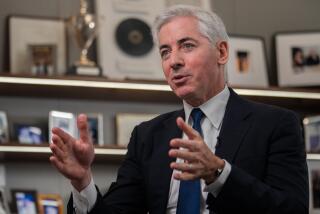Madoff’s betrayal
Wall Street today may be a vast global community with multinational reach. But it’s also a small, insulated world based on trust, where your word and a handshake are your bond.
Or not.
Just ask Steven Spielberg, or Jeffrey Katzenberg, or anyone else unfortunate enough to have invested money with accused swindler Bernard L. Madoff.
As news that Madoff’s high-flying money management business apparently was nothing more than a Ponzi scheme made its way around the Street, the near-universal reaction was utter disbelief. Not disbelief that someone could brazenly rip off innocent investors; nobody in the financial community is capable of being shocked by that anymore. And not even disbelief at the scope of the crime, though at an estimated $50 billion, Madoff’s definitely would be a scam for the record books.
No, the reason so many Wall Street players couldn’t believe their ears was they couldn’t accept that Bernie Madoff, of all people, would have pulled something like this. “Not Bernie!” was a typical refrain.
Madoff was always one of the “good guys” in the dicey financial world, someone who championed the interests of the small investor. His career on Wall Street famously began with $5,000 he saved from his job as a lifeguard in Brooklyn.
I interviewed Madoff several times, and he always struck me as the genuine article. He was eager to explain how his firm used technology to make stock trading less expensive and more democratic. He sincerely wanted to make things fair for the little guy. With his working-stiff-makes-good story and messianic belief in the power of financial markets, he had the stench of credibility.
Unfortunately, it turns out that I -- like everyone else -- probably was smelling something else entirely.
But until very recently, Madoff was lionized as the epitome of responsibility on Wall Street. He was instrumental in the Nasdaq’s emergence as an accessible alternative to the clubby New York Stock Exchange. He even served as Nasdaq chairman in the early 1990s. His public mantra was that financial markets work best when there’s transparency, meaning that everyone has the same access to information and prices. He told anyone who’d listen that the stock market had to be open and free. In short, he was viewed as a guardian of decency among the vicious sharks.
He also was viewed as someone with incredible investing acumen. Although managing money was only a tangential part of Madoff’s business, he posted remarkably steady returns of about 10% a year in good times and bad over nearly two decades. As word of his success got around, Madoff cultivated a highly exclusive clientele among wealthy communities in New York, south Florida and Southern California. In certain circles, having Madoff manage your money was something to brag about, like a luxury car or a fancy house.
However, unlike many other successful money managers, Madoff was reluctant to discuss his investing style. In his financial documents, he simply described capitalizing on market movements using stock options. But there were few details on precisely how he was able to put up those steady returns for so long.
This is the problem with personality-driven investing. We want other people to take care of our money for us, and we usually don’t understand what they’re going to do with it. In fact, that’s often the point. Investment managers like to paint their strategies as so complex that only mathematical geniuses can understand them. As a result, investors are left to simply trust that these gurus won’t blow their hard-earned cash.
Madoff’s reputation put him in such high demand that he could literally pick his clients. It’s no fluke that he managed money for numerous Jewish charities, one of his deep interests. Yeshiva University, the UJA Federation, Hadassah and foundations started by the author Elie Wiesel, New Jersey Sen. Frank Lautenberg and publisher Mortimer Zuckerman all invested with Madoff. So did major nondenominational philanthropic groups such as the Innocence Project and the JEHT Foundation.
Trust is essential for these kinds of organizations, which typically look for investment managers who will handle their money ethically and with a high degree of discretion. Charitable foundations need people who will manage their capital responsibly and with a great deal of savvy so that they’re protected when markets turn sour. That’s precisely the kind of person Madoff seemed to be. Trustworthy.
Yet as far back as 1999, the Securities and Exchange Commission was receiving credible complaints that the investment arm of Bernard L. Madoff Investment Securities actually was an enormous fraud. In May 2001, the respected financial magazine Barron’s ran a story openly questioning Madoff’s trading techniques and raising potential ethical issues with the secretive way he operated.
But Madoff simply called the allegations “ridiculous,” and everyone believed him. Regulators ignored the evidence and failed to pick up the scent. The rest of the media just dismissed the accusations. And investors kept pouring money into his funds.
This was a huge mistake. As we now know, Barron’s and the SEC’s tipsters were on to something. There was something fishy with Madoff’s business. In essence, he wasn’t earning those great returns at all. Instead, it appears that he was simply paying off old investors with money he was bringing in from new investors. It was a classic Ponzi scheme, and as soon as the economy tightened up and new money stopped flowing in, the whole thing unraveled.
As a result, today countless investors and charities are out billions of dollars. It’s a truly depressing state of affairs, and enough to make you wonder if we’ve finally shaken whatever faith Americans may still have had in their foundering financial markets. After all, if you can’t trust Bernie Madoff, who can you trust?
Eric J. Weiner, the author of “What Goes Up: The Uncensored History of Modern Wall Street,” is working on a book about the evolution of international capitalism.
More to Read
A cure for the common opinion
Get thought-provoking perspectives with our weekly newsletter.
You may occasionally receive promotional content from the Los Angeles Times.






